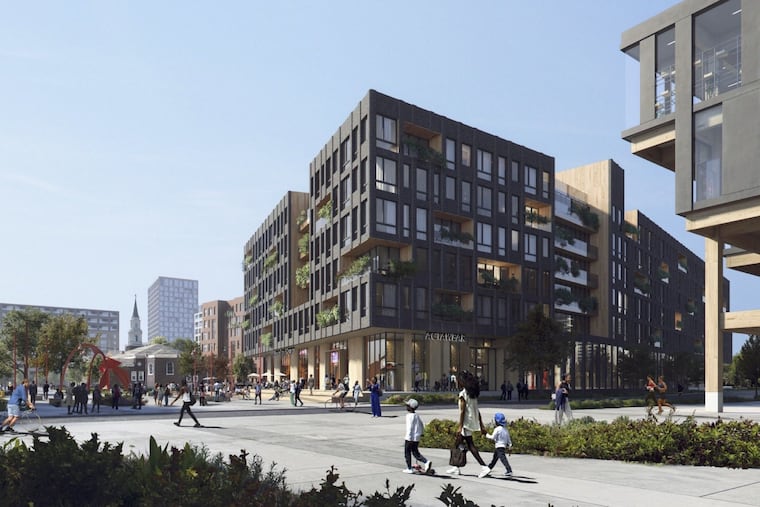Developers of huge project at Philly Navy Yard commit $1 billion for diversity
Mosaic Development Partners says it will employ a 35 percent diverse construction workforce with half of the workers coming from the Philadelphia region.

The developers pursuing a $2.6 billion project at the South Philadelphia Navy Yard said they are committing $1 billion of that money to hiring workers and contractors from underrepresented groups and taking other diversity measures over the next two decades.
Mosaic Development Partners and Ensemble Real Estate Investments will open the project to underrepresented investors and put $1 million into a charitable foundation to support the development of minority- and women-owned firms. Executives also promised to make available a quarter of the retail sites to women, minority, veteran, and disabled business owners with subsidized leases, the team said Tuesday.
The partners pledged to employ a 35% diverse construction workforce with half of the workers coming from the Philadelphia region.
“It will be incredibly inclusive at all levels,” said Gregory Reaves, co-owner of Mosaic Development Partners, based in the Strawberry Mansion section of North Philadelphia. Mosaic is developing the site with Ensemble Real Estate Investments of Long Beach, Calif.
Because the real estate project will advance in stages, executives said, the diversity commitments would create an ecosystem of specialized firms owned by underrepresented groups and women that would spur them all forward.
Reaves noted that Philadelphia-area construction firms in those categories “have a very difficult time growing because they don’t get consistent work. They might get a job that is a quality job and they might not be asked to bid again on a quality job for three years or more. They are not in the game enough.”
So far, Mosaic/Ensemble team has placed $7.5 million of the design and engineering contracting with underrepresented, women, veteran and disabled-owned businesses, or 50% of the initial-stage design funds.
Among the retained firms is Moody Nolan, one of the nation’s largest Black-owned architectural firms, the developers said. Mosaic/Ensemble listed an additional 19 firms that were included in the $7.5 million “commitments in process.”
The developers are building 610 apartments, pharma labs, a parking garage, and a hotel in the project’s first phase, expected to cost $480 million.
As much as 20% of the equity in the project will be provided by investment firms owned by marginalized people or investors of color, said Brian Cohen, regional director for Ensemble, who worked for 19 years at Liberty Property Trust, which was bought in 2020. This amounts to an estimated $300 million to $350 million with a potential for substantial investor returns. Cohen said that marginalized investors have traditionally been blocked from investing in big projects such as this one.
In addition, Philadelphia residents can invest much smaller amounts into the project through a crowdfunding platform. “It allows people who are local and live across the street to say ‘I own a piece of that,’” Reaves said.
The Philadelphia Industrial Development Corp., which manages the Navy Yard on the city’s behalf, chose the Mosaic/Ensemble team in 2020 to develop the 109-acre parcel. Ensemble is a major property owner at the Navy Yard, while Mosaic has developed mixed-use projects in North Philadelphia and Germantown.
Kate McNamara, PIDC senior vice president, said that Mosaic/Ensemble “put their money where their mouth is” with diversity and equity. The diversity goals are not tied to tax breaks, she said. The PIDC and the city would check to see whether the commitments were being met over time, she added.
Kam Babaoff, Ensemble’s co-founder and chairman, said in a news release on Tuesday that the $1 billion commitment was “likely the largest pledge ever in our industry.”
Black and female workers have long been underrepresented in the construction industry. Brian Turmail, spokesman for the Associated General Contractors of America, said the industry has focused on diversifying its workforce over the last several years. Executives also fear a labor shortage, particularly in fast-growing areas of the nation.
The federal government closed the Navy Yard as a military base in the mid-1990s. Since then, 150 businesses that employ 15,000 workers have located at the site, which is visible from I-95 and a short distance from the Philadelphia International Airport.
There are plans for three apartment buildings of five to seven stories each. “We need to make sure we brought the appropriate scale to bring a community,” Reaves said. Mosaic and Ensemble executives said they have an “ongoing commitment to providing housing affordability for 15% of all residential units.”
The Mosaic/Ensemble team plans a speculative 130,000-square-foot pharmaceuticals lab in the project’s first phase. It also hopes to build a custom pharma-manufacturing plant to boost the region’s growing life-sciences sector.
Over time, the developers plan more than one million square feet of life sciences and office space on the 109-acre site and 350,000 square feet of retail space.
There are plans for a hotel but they have not been completed. Ground could be broken on the first building later this year, Cohen said.
The Philadelphia Inquirer is one of more than 20 news organizations producing Broke in Philly, a collaborative reporting project on solutions to poverty and the city’s push toward economic justice. See all of our reporting at brokeinphilly.org.